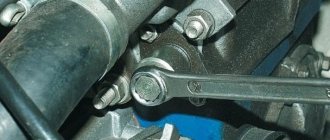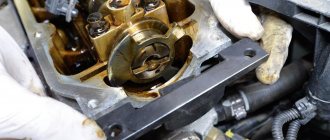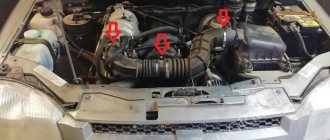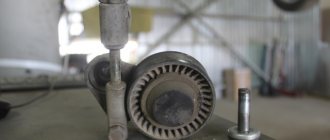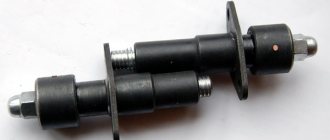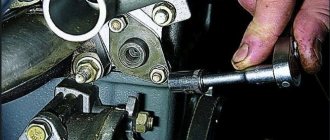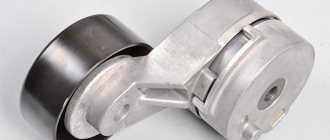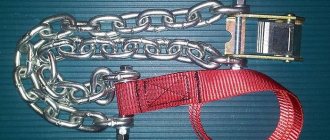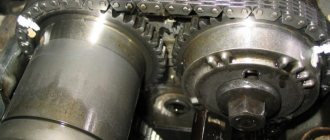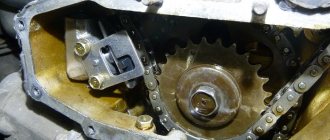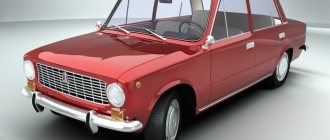Purpose of the chain tensioner shoe
Early models of VAZ engines (2101 and 2103, installed on all VAZ Classic models, as well as 21213 and 21214, installed on Niva cars) use a chain drive of the gas distribution mechanism, which has a number of undeniable advantages over a belt-based drive. In particular, the chain reduces the likelihood of slipping and incorrect engine phases, it is more reliable and durable, allowing for less frequent timing maintenance. However, such a drive works normally only if the chain has constant tension with a certain force. This problem is solved using a system of two main parts - a chain tensioner and a tensioner shoe.
The tensioner and tensioner shoe solve several problems:
— Provide optimal timing chain tension throughout the entire range of crankshaft rotation speeds; — Compensate for weakening of chain tension when it is stretched (in automatic mode or during manual adjustment); — Uniform distribution of the load from the pusher over the chain section, reducing the degree of wear.
The tensioner is installed on the ascending side of the chain between the crankshaft gear and the camshaft gear. Between the tensioner and the chain there is a movable shoe (it has one fulcrum and can swing), which receives the force from the tensioner and distributes it along the chain. The chain tensioner shoe plays an important role in the operation of the timing belt, so let’s look at this part in more detail.
Theory
I'll start from afar. When we work and tune a carburetor engine, we actually act on “intuition and experience.” Set up the ignition as usual. We accelerated to 4th gear and sharply throttled. If the engine choke and knocks, we stop, roll the distributor back to positive, drive on, and so on. On an injection engine the picture is different. The engine is covered with sensors, like a child's Christmas tree. The ignition is controlled by the DD, that is, the knock sensor. It monitors detonation in the cylinders. Now, as Susanin said, we are almost there. All rotation parts in the engine are plain bearings (crankshaft bearings, camshafts, etc.). And then suddenly we have two rolling bearings.
Types and design of tensioner shoes
On VAZ-2101, 2103, 21213/21214 engines of all modifications, sliding tensioner shoes are used - the chain slides along their surface, which has an anti-friction coating. Today you can find two types of shoes, differing in materials of manufacture:
- Old-style shoes - metal with anti-friction coating; — The new type of shoes are solid plastic.
The old style tensioner shoes have an extremely simple design. The basis of the part is a bent steel plate, at one end of which there is a loop for mounting on the engine. On the outer (convex) side, a layer of plastic is applied to the plate, with which the shoe slides along the chain. On the inside, closer to the end of the shoe, a bracket is attached with the help of two rivets - a stop for the tensioner.
The new style shoe is a one-piece plastic part that has an arched shape with a molded bracket for the tensioner stop and a loop for mounting on the engine. To increase strength and reliability, stiffening ribs are made in the body of the shoe.
According to their applicability, tensioner shoes are divided into several groups:
— Shoe type 2101-1006090 — used on VAZ 1200 and 1300 engines. A distinctive detail of this shoe is a semicircular recess in the upper part of the bracket (pusher stop); — Shoe type 2103-1006090 — used on VAZ 1500 and 1600 engines. A distinctive detail of this type of shoe is a semicircular recess in the lower part of the bracket (from the hinge side); — Shoe type 21213-1006090 — used on the VAZ-21213 (1700) engine. It has no marks and is larger in size; — Shoe type 21214-1006090 is a modern plastic shoe used on VAZ-21214 and some other 1700 engines.
There was also a universal tensioner shoe available in the 1970s, but it is impossible to find today.
The tensioner shoe is installed under the timing cover; it is mounted on the engine using one complexly shaped bolt, which also acts as an axle. Such a bolt ensures reliable installation of the shoe, but at the same time prevents excessive tightening and jamming of the part during operation.
ZMZ 406 shoes or stars, practice
Despite the large amount of equipment, I use old school tools. In particular, as the son of a doctor, I have in my arsenal scalpels, vessel clamps, scissors and, of course, a medical stethoscope. Even with the help of an ear and this simple device, you can compare the noise level from the sliding shoe and from the sprocket on the bearing. They differ very much and not in favor of the “asterisk”. The data can also be viewed using the program at the input to the ADC. The knock sensor perceives this “noise” as detonation in the cylinders and rolls back the ignition “to positive” (later). Thus, no matter how much you work with the engine, you will not get thrust and ignition timing.
If you want to work on the engine and try to get acceptable performance from it, work with a timing belt that has sliding shoes. If you want reliability, you can use “long chains” with sprockets on bearings, but do not demand anything “genius” in terms of characteristics from this engine.
Let me draw your attention to the fact that as long as the bearings are in working condition, the overall picture is not so sad. But as soon as backlash and “rolls” appear, there is no need to talk about the engine’s characteristics in principle.
Issues of maintenance and replacement of tensioner shoes for VAZ cars
The tensioner shoe does not require maintenance during operation. However, over time, the shoe lining (or the working surface of the plastic shoe) wears out and loses its characteristics; such a shoe can no longer provide chain tension with the required force and requires replacement. The need to replace the shoe is indicated by the characteristic noise of the chain; in advanced situations, the chain may even skip. The shoe should also be replaced if it is deformed or mechanically damaged (this is only discovered during engine repair or maintenance, when the timing cover is removed).
Replacing the tensioner shoe is not the easiest operation, so it should be approached responsibly. In general, the work is performed in the following order:
- Remove the mudguard from the power unit;
- Remove the generator drive belt;
- Remove the fan assembly with casing and electric motor;
- Remove the crankshaft pulley mounting nut and remove the pulley;
- Loosen the sump fastening on the timing drive side;
- Unscrew the bolts securing the timing drive cover, carefully remove the cover (in this case, use a screwdriver to pry the cover so that its lower edge comes out from under the pan);
- Unscrew the bolt securing the tensioner shoe, remove the shoe;
- Install a new shoe;
- Install all removed parts in reverse order.
After installing a new shoe, adjust the chain tension, which is done using a tensioner.
If the tensioner shoe is replaced in a timely manner, the timing drive of cars of the “classic” VAZ family will work confidently and reliably, ensuring high-quality engine operation in any conditions.
Replacing the Chain Tensioner Shoe VAZ 2101
Replacing the camshaft drive chain tensioner shoe on a VAZ 2123
When the chain tensioner shoe wears out, the tensioner's operating range becomes insufficient to restore chain tension. The chain begins to rattle while the engine is running. In this case, replace the shoe.
You will need: keys “10”, “13”, “17”, a special wrench for the crankshaft pulley mounting nut, a screwdriver, a mounting blade, a hammer, and a bit.
Replacing the damper shoe without dismantling the radiator is only possible with sufficient skill of the performer, since the space between the engine and the radiator is very small.
If you have no experience in this type of work, we recommend removing the radiator. In addition, for ease of operation, we recommend removing the oil sump protection and the engine mudguard, since the three oil sump mounting bolts, which simultaneously secure the timing cover, are difficult to access from above from the engine compartment.
2. Loosen the tension on the power steering pump drive belt and remove the belt.
3. Disconnect the wiring harness from the crankshaft position sensor.
4. Disconnect the power steering pump from the engine by unscrewing the two front bolts securing the pump bracket.
Please note: there is a spacer washer installed under the upper front bolt, do not lose it, and when reinstalling the pump, install it in its original place.
Content
hide
1 Replacement: tensioner, shoe, damper and timing chain VAZ-2101
2 Replacing the chain tensioner shoe on a VAZ 2101 VAZ 2107
Replacement: tensioner, shoe, damper and timing chain VAZ-2101
Replacement
:
tensioner
,
shoe
, damper and
timing
chain
VAZ
-
2101
.
Replacing the chain tensioner shoe on a VAZ 2101 VAZ 2107
Would you like to learn more about how to replace the chain tensioner shoe?
on
VAZ 2101
-VAZ 2107? And also interested...
5. . rear i.
6. . the upper bolts and move the pump to the side along with the bracket and hoses.
Please note: there is a spacer washer installed under the top bolt, do not lose it, and when reinstalling the pump, install it in its original place.
7. Unscrew the nut securing the pulleys and remove the pulleys.
8. Unscrew the three bolts securing the pan to the camshaft drive cover and loosen (by unscrewing by 2-3 turns) the two adjacent bolts securing the pan to the engine crankcase.
9. Unscrew the remaining bolts and nuts securing the camshaft drive cover and,
10. . Using a screwdriver, remove the cover and...
eleven. . its gasket. Each time you remove the cover, replace the cover gasket with a new one, even if the old gasket remains intact. Before installation, lubricate the new gasket on both sides with a thin layer of sealant.
12. Remove the camshaft drive chain tensioner.
13. Remove the bolt securing the tensioner shoe and.
14. . remove the shoe. Pay attention to the original shape of the shoe - it differs from the shoes previously used on VAZ engines. Buy the exact same shoe.
15. Install the new tensioner shoe and the removed parts in the reverse order of removal.
Post Views: 635
Product description
Branded developments:
- Innovative USPK technology was used in the production of oil and petrol resistant rubber:
BNKS-28AMN (synthetic butadiene-nitrile rubber) is used in the recipe.
Benefits for the car enthusiast:
- Warranty 2 years unlimited mileage
- Availability: In stock
- Length: 16 cm x Width: 6 cm x Height: 3 cm
- Weight: 0.45 kg
- Product code: 4877
- Cash upon receipt (cash on delivery)
- Online payment by bank cards without commission
- Electronic wallets
- According to the organization's account (excluding VAT)
- Post office
- SDEK | DPD | PEC
- Business Line
- Energy | GTD (KIT)
- Baikal Service
- ZhelDorExpedition
- Dispatch from 1 day
- Delivery from 2 days
- Product didn't fit? Easily return it within 14 days
- Read about other store guarantees
About the knock sensor
There is one big problem with our engines. This applies to both VAZ and ZMZ. These are sensors. Or rather, complete seams in the characteristics of the work. Sometimes you see a gorgeous picture. A car arrives, the engine almost jumps out from under the hood. Two or three sensors are replaced and the engine’s operation is no longer recognizable. Typically these are the knock sensor, throttle position sensor and idle air control valve. Several of my experiments on ZMZ engines showed that knock sensors “made in Russia” and “made in Germany” are two big differences. Their sensitivity is completely different. As a result, the engine operates differently, especially in transient conditions.
A paragraph for those who believe that on . Let me remind you that the sensor is called a KNOCK sensor. And detonation occurs in the COMBUSTION CHAMBER. On high-quality engines known to me, the combustion chambers are located close to the combustion chambers. As a rule, on the studs of the intake manifolds. Look where the sensor is located on ZMZ engines and smile sadly. At this point, it measures anything except detonation in the combustion chambers. As a rule, until the DD error comes on, many people do not know where it is. I remind you of its location, in the area of the starter, rear, left side, if you stand facing the hood.
Tuesday, June 15, 2010
Work on mistakes
This is an interesting story about how the experience and inquisitive mind of a rally driver and modern technology were able to do what a huge engine plant could not do.
By installing the contents of this box on any of the same type of ZMZ engines - 406, 405 or 409, you can forget about the gas distribution mechanism drive problems traditional for these engines. The inexpensive set of parts that our company produces also allows you to increase the service life of the cylinder head parts, and in some cases, add power to the engine.” This is roughly how the director of the Moscow region commercial and industrial enterprise, Vladimir Tolstopyatov, began the conversation. “Every sandpiper praises its swamp,” I thought in response. However, after a couple of hours, by the end of the conversation, which was interrupted by an inspection of the production facilities of the enterprise, the skeptical mood had disappeared. It was replaced by a feeling of respect for the company’s specialists, who really managed to find a brilliant solution to a difficult technical problem. It even became a shame that I don’t have a car with a 406 engine - I would definitely install a kit on it. I'm sure it's worth it. What this confidence is based on will become clearer in the following narrative.
